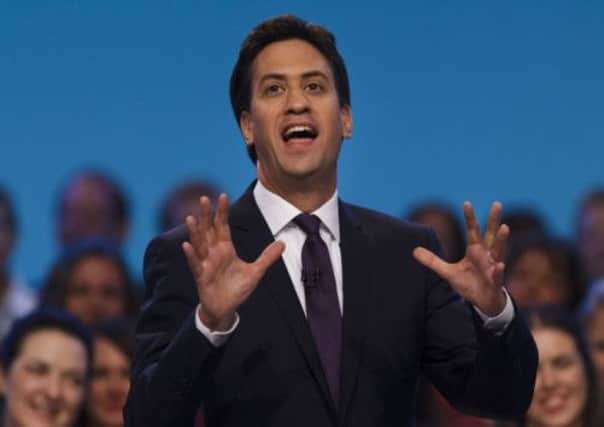Jack Blanchard: Bold move by Miliband turns energy bills into the battleground for power


In an era where politicians of almost every hue scrabble over the same narrow patch of centre ground, there is a school of thought that to beat your opponent you must successfully pin them into a corner, painting clear red boundaries between you.
Bill Clinton and Gordon Brown were both keen proponents of this approach to politics, while more latterly George Osborne has used welfare as his own dividing line. The Chancellor has a habit of tossing up ever more draconian measures, safe in the knowledge that Labour will always rail against them – so allowing him to portray them as the “party of welfare”.
Advertisement
Hide AdAdvertisement
Hide AdNow Mr Miliband has laid a trap of his own. His audacious plan to freeze energy prices – for all its inherent risks – could provoke only one response from the Government. Within minutes of his speech on Tuesday afternoon, Ministers were queuing up to echo the stark warnings from the energy firms about blackouts and job losses and goodness knows what else.
This suits Mr Miliband just fine. It was clear yesterday morning that he had both anticipated, and relished, this confrontation.
“Now we see the Government taking the side of the energy companies,” he said. “Well, I am determined to stand up to them.”
This will be his narrative over the next 18 months – the plucky outsider standing up to big business on the behalf of struggling families, as the Government looks complacently on.
Advertisement
Hide AdAdvertisement
Hide AdIndeed, the proposed energy price freeze, along with Shadow Transport Secretary Maria Eagle’s stinging rebuke to rail companies over their shabby ticketing practices and the “use it or lose it” threat to land-banking developers, marked the crystallisation of three years of previously unfathomable discussion from the Labour leader.
The abstract issues Mr Miliband has repeatedly raised in the past – “predatory capitalism”, “pre-distribution” and so on – suddenly have a little meaning. There is meat on the bones. No longer can Labour be accused of being a policy-free zone.
This week we have seen a glut of pledges – a freeze on energy prices; free childcare for working parents; longer school opening hours; a higher minimum wage in certain sectors; votes for 16-year-olds; a massive programme of house-building; a repeal of the so-called bedroom tax; an £800m cut in business rates.
Some gaping holes remain, of course. Nowhere in Mr Miliband’s speech was there any indication of how the budget deficit is going to be closed. There was nothing on crime, little on education. But 18 months out from the general election, we are suddenly an awful lot closer to seeing what a Miliband government would look like.
But will the British public like what they see?
Advertisement
Hide AdAdvertisement
Hide AdCertainly, much of the Press do not – the headlines and leader columns yesterday frothed with predictable fury in the aftermath of Mr Miliband’s ‘70s-style pledges of land grabs and price freezes. But the Doncaster MP and his team will be undeterred.
Their calculation is simple – there is nothing that “Red Ed” could possibly do now that would win him the Blair-style backing of certain Conservative-leaning newspapers. There is therefore little to be gained from Blair-style sops to the Right.
Instead, Mr Miliband has made a straight pitch for populism. Who doesn’t feel the energy companies and rail firms are ripping them off? Who doesn’t think that a struggling small business is probably in need of a tax break – perhaps more so than the largest corporations?
These are big, bold moves and, crucially, they will sell easily on the doorstep. Labour activists can now spell out to floating voters in the plainest of terms precisely how the party will stand up for them against the “predators’”of the corporate world.
Advertisement
Hide AdAdvertisement
Hide AdMr Miliband believes he has found a way to put money in people’s pockets without resorting to unsustainable tax-and-spend. It is big business, not the Treasury, which will have to cough up.
Tomorrow, attention will begin to turn to Manchester, as the Conservative Party starts to gather for its own conference this weekend – and where David Cameron must deliver his riposte.
Already the wheels are in motion. The scare-mongering over black-outs by the furious energy firms will be seized upon.
The reversal of the bedroom tax will be painted as the typical response of a Labour Party still addicted to pouring public money into an unsustainable welfare system.
Advertisement
Hide AdAdvertisement
Hide Ad“Same old Labour,” will be the refrain from Tory Ministers over the coming days and weeks. It is an effective approach, particularly while the tainted Ed Balls remains as Shadow Chancellor.
But Mr Cameron will know this may not be enough. Because for all his party’s new-found buoyancy over the recovering economy and Labour’s increasingly slim poll lead, perhaps the most important snippet of information this summer came from one of the Tories’ own internal polls.
Lord Ashcroft’s study of key marginal seats this month found Labour are significantly further ahead in the battleground constituencies than in the country as a whole. These are the areas where the election will be won or lost – and Labour has itself a 14-point lead. With numbers like these in 18 months’ time, they would be home and dry.
Mr Miliband pulled the riskiest of rabbits out of his hat this week. The question now is whether Mr Cameron has a similar magic trick of his own.
*Jack Blanchard is the Yorkshire Post’s political editor.